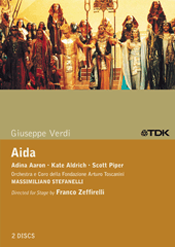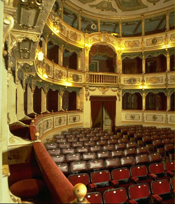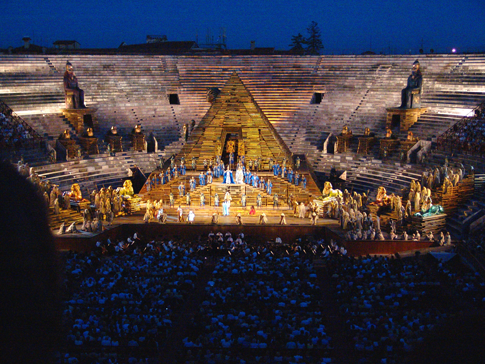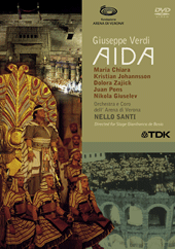
06 Jul 2008
Two Aida’s from TDK
At one time, Verdi’s Aida figured as the most performed opera.
This Dynamic recording of Meyerbeer's Semiramide, an opera title more familiar with Rossini's name appended, mixes the pleasure of a modestly appealing surprise with regret at key aspects of the performance.
Among the choral music of Anton [Antonin] Dvorak, the familiar Stabat Mater, Op. 58, is known to modern audiences through various live performances and recordings.
A nostalgic charm permeates these filmed productions from the early 1970s of Lortzing's Zar und Zimmerman and Mozart's Die Zauberflöte, collaborations between the Hamburg State Opera and German TV director Joachim Hess.
The opera highlights series from Classics for Pleasure continues its recycling of the EMI catalogue with selections from two of Herbert von Karajan's recordings.
With this recording of songs by Henry & William Lawes, musical brothers who flourished in Caroline England, countertenor Robin Blaze with lutenist Elizabeth Kenny continue their exploration of early English song for Hyperion, and the results are stunning.
The title of this recording “Joy: the Laments of Gilles Binchois” introduces a seeming contradiction, one that plays on a contemporaneous description of the composer as "pére de joyeusetè"—the father of joy—in tension with an affinity for melancholy in his works.
Even though it is one of the important operas of the twentieth century, Arnold Schoenberg’s Moses und Aron is, perhaps, more esteemed than performed.
Premiered in 1926, Paul Hindemith’s opera Cardillac is a three-act work based on E. T. A. Hoffmann’s short story Das Fräulein von Scuderi.
In the 1983 production designed, staged, and directed by Jean-Pierre Ponnelle, this recording of Richard Wagner’s Tristan und Isolde is a solid and well-thought performance that has much to offer.
Recorded between 1938 and 1942, the excerpts from performances of Der Rosenkavalier, Die Frau ohne Schatten, Arabella, and Daphne at the Dresden Staatsoper are all conducted by Karl Böhm.
At the centenary of the birth of the conductor Herbert von Karajan various commemorations are occurring, an among them is the concise CD and DVD release by Deutsche Grammophon, with both discs bound into a booklet that includes a short prose tribute to the man illustrated with some well-chosen photographs from various parts of his career.
Consumers might opt for a highlights set instead of a full recording of an opera for many reasons.
Naxos's DVD division has already released the performances on this disc of Virgil Thomson's scores for The Plow that Broke the Plains and The River, as soundtracks for a re-release of the original films. That DVD (Naxos 2.110521) contained, as...
As difficult as it is to identify a single score as representative of its composer, Symphony no. 8 in C minor by Anton Bruckner is an essential work that may be regarded as the quintessence of his accomplishments in the form.
This production offers a different view of Norma. As Stage Director Guy Joosten explains in the introduction on the first of a 2-disc set, he wanted to give the audience “more” of what he believes the modern audience expects.
If Friedrich August Kummer is not a household word in your home, no reason for concern — he is one of the prolific Kleinmeistern of the post-Beethoven generation, a generation for which the cost of printing had dropped so much that it was financially possible for a composer to produce hundreds of published opuses.
This installment of John Eliot Gardiner’s impressive Bach Cantata Pilgrimage comes from close to the end of his millennial Wanderjahr, presenting cantatas for Christmas week.
Timeless values of great opera conducting fill this disc of overtures and preludes, all conducted by Tullio Serafin.
William Byrd’s affinity for the Latin motet found various outlets.
Why should anyone buy a German language broadcast of a delicious French opéra-comique?

At one time, Verdi’s Aida figured as the most performed opera.
The Metropolitan Opera’s database, for example, shows that it has been performed there more than 1,000 times since November 1886. The number of performances has declined in recent years, largely because of the work’s cost of production, the work’s vocal demands and the work’s relative conservatism. Nonetheless, Aida holds an important place in Verdi’s oeuvre and today’s repertoire. As Roger Parker has noted:
Aida remains the most radical and ‘modern’ of Verdi’s scores: its use of local colour. Aida, constantly alluding to its ambience in harmony and instrumentation, is the one Verdi opera that could not conceivably be transported to another geographical location. In this respect it was an important indication of the influence local colour would come to have over fin-de-siècle opera, and an object lesson on the delicacy and control with which this colour could be applied to the standard forms and expressive conventions of Italian opera.
Roger Parker: ‘Aida’, Grove Music Online (Accessed 25 June 2008).
Before me are DVDs of two highly disparate productions of Aida. One is a production presented at the Arena di Verona. Built in 30 C.E., the Arena is a huge open-air structure that seats 15,000.
The other production by the master of extravaganza, Franco Zeffirelli, comes from Teatro Giuseppe Verdi in Busseto, Verdi’s birthplace. Teatro Giuseppe Verdi barely seats 350; but this lovely theater is truly a small jewel.
Aida is a colossal work that brings out massive ideas in stage design. These two productions live up to that concept perfectly. So I will review these DVDs separately. But I invite the reader to keep in mind the contrasts between these productions as well as their similarities. Those very things are a tribute to the mastery of Verdi.
 Teatro Giuseppe Verdi
Teatro Giuseppe Verdi
| Aida | |
| Teatro Giuseppe Verdi, Busseto Italy | |
| Performance: January 27, 2001 (the 100th anniversary of Verdi’s death) | |
| Production designed by Franco Zeffirelli | |
| Conductor: Massimilano Steffanelli | |
| The King of Egypt | Paolo Pecchioli |
| Amneris | Kate Aldrich |
| Aida | Adina Aaron |
| Radames | Scott Piper |
| Ramfis | Enrico Giuseppe Iori |
| Amonastro | Giuseppe Garra |
Coached by Carol Bergonzi and directed by Franco Zeffirelli , this production cast young performers to celebrate the 100th anniversary of Verdi’s death. The size of the theater did not stop Zeffirelli from doing what he does best-spectacle. What actual sets there are look massive and fit the aura of what Aida is supposed to look like. Other dramatic views are achieved through the skillful use of painted or projected back drops. Albeit small, the orchestra was up to the task in the theater’s tiny pit. The flute solo was particularly notable.
The singers, who were then hardly in their 20's, are not well-known. Some may recognize a few of the names, such as Kate Aldrich and Scott Piper.
Piper possesses a nice tenor voice. As Radames, he tentatively tackles “Celeste Aida,” delivering a credible rendition of that monster. He can sing loud and with a robust sound, be it in victory or rejoicing, yet sings tenderly and softly in the last duet.
Kate Aldrich performs Amneris. One does not think of a mezzo tackling this role early in a singer’s career, but Aldrich makes Amneris believable. Although she does not bring the subtlety to it that a Zajick does, that is a learned attribute. Aldrich is sensitive, cunning yet able to demonstrate the insecurity of thinking her chosen man has given his heart to another. When she knows at the end of Act IV that she has lost Radames, her remorse is clearly felt.
It is a bit disconcerting to see the High Priest, the King, and Amanastro so youthful looking and sounding. They are nevertheless believable and refreshing.
Zeffirelli skillfully handles the “big scenes” on the tiny stage. He does not include the ballet for the most part. And the grand triumphal march is presented as a parade that the waving extras look on. We see their backs as they jockey for position to see the spectacle. The music is well played so we do not miss that triumphant moment. As the parade ends, Radames appears in the Temple where the victory ceremony is performed.
There are other nice touches. In Act III Aida sings of her country (“O Patria mia”) as she sits at the banks of the river and reaches into the water to touch it and bring her wet fingers to her face…….almost as holy water. Aaron sings this great aria convincingly.
My favorite portion of Aida is the ending duet. I want it to be tender and loving. These two young singers do it with aplomb.
The costumes are lush and lavish. Soft pastels and vivid reds are well presented. The colors darken as the tragic ending of the opera approaches.
I found this little production refreshing. I appreciated what it must mean to these young singers to work with the masters like Bergonzi and Zeffirelli and to be in a DVD that is in world wide distribution.
 Aida at Arena di Verona
Aida at Arena di Verona
| Aida | |
| Arena di Verona | |
| Performance: August 1992 | |
| Production directed by Gianfranco De Bosio | |
| Conductor: Nello Santi | |
| Aida | Maria Chiara |
| Il Re | Carlo Striuli |
| Amneris | Dolora Zajick |
| Radames | Kristjan Johannsson |
| Amonastro | Juan Pons |
| Ramfis | Nicola Ghiuselev |
 This massive production befits the location. Opera has been presented in
the Arena di Verona since 1913. Production designers have been tempted by the
vastness of the space available to them, and have often used live animals and
enormous sets.
This massive production befits the location. Opera has been presented in
the Arena di Verona since 1913. Production designers have been tempted by the
vastness of the space available to them, and have often used live animals and
enormous sets.
This production follows the traditions of this ancient arena. Huge sets depicting the temple, trumpeters high above the top of the sets and a cast of what seemed like thousands (but probably not quite that many!). There are live horses in the triumphal scene, but no elephants!!
All of the ballet music is there along with the dancers. Nothing is missing in this extravaganza.
Maria Chiara was arguably one of the great Aida’s of her time. She was the partner of many a great Radames, including Luciano Pavarotti. This time frame is late in her career but she still can carry off the role. There are a few rough patches at the top of her voice but not enough to really complain about. Her “O Patria Mia” is lovely and heart wrenching.
When this video was made, Kristjan Johannsson was just beginning his career, which led him to the Met as well as most of the opera houses in Europe. His style is rough and direct. His only voice level is loud. I hesitate to be overly critical in that the location could well be overwhelming and the tenor may have tried to over compensate for that. When a bit of a tender sound is called for, as in the final duet, Johannsson is just not able to produce it. His robust moments, however, are more appropriate.
Juan Pons as Amonastro is worth watching and hearing. He brings to the role the tenderness of a father and the regalness of a King.
Dolora Zajick is a force to be reckoned with. This voice is truly amazing. Her acting ability is everything one would want from this Amneris. She easily makes us hate her, empathize with her and in the end mourn with her. She is one of the great Amneris’ of our time.
Nello Santi is an old pro and the orchestra gets to show off all its skills as it traverses Verdi’s score. We all wait for the trumpets and brass in this opera; but there are some wonderful flute solos, as well.
This video is well worth the time to watch Aida as a huge spectacle and to hear some amazing singing by the women in the cast. With the exception of Pons, one must bear the male performers to enjoy this production.
Cheryl Dowden